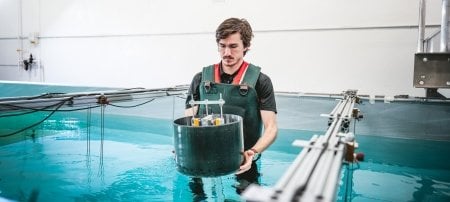Chelsea Schelly is taking the mentorship she received in interdisciplinary research and putting it to use at Tech, leading collaborative projects that have real impact on sustainability in the region.
"Even as a PhD student, I knew I wanted to do interdisciplinary work," says Chelsea Schelly, sociology professor. "I knew the questions I was interested in were things I couldn't answer by myself."
While finishing her PhD at the University of Wisconsin-Madison, Schelly got explicit training in interdisciplinary scholarship, then turned her attention to finding work at a university where she could put those skills to use.
"I wanted to do interdisciplinary work at a research-heavy institution, but I didn't want to be in suburbia," Schelly recalls. "I didn't want to have that kind of relationship to place. So when I saw this job, I thought, 'That could be a good fit for me.'"
When Schelly arrived in Houghton to interview, faculty members in the Department of Social Sciences wanted to take her out to see the community. "They asked me, 'How do you feel about cross-country skiing?' I had never even been on cross-country skis before. But I decided just to say yes and go with the flow." One person loaned Schelly an extra pair of skis, and another told her to bring a coat. "So for my job interview, I got to go skiing with Kathy Halvorsen, who turned out to be a mentor and a super-strong advocate for me."
Schelly credits Halvorsen, now the University's associate vice president for research development, with teaching her many of the essential skills for successful team science, like what to do when people on the team perceive time differently. "Kathy always said to never think about differences as a reason for not doing a project," Schelly says. "So if you know someone on the team really struggles with deadlines, or has a different approach to collaboration, find another person to complement those approaches rather than seeing them as weaknesses or gaps."
"It's just the culture that has been created on campus. There's a human connection here. We are scholars, and we are proud of the work we do, but we are people first."

More than anything, though, Halvorsen's humanity made the biggest impression on Schelly. "Kathy sees people as whole people, and as people first, not just as scholars." This approach to life and work is, for Schelly, the defining feature of what makes research at Michigan Tech unique.
"It's also just a very different environment here in that way—very friendly," she says. "You may have a conversation with someone at work, then later you see that same person at the grocery store. Even the most productive scholars on campus start with, 'How are your kids? What did you do this summer? What are you doing this weekend? When are you going hunting?'"
Schelly strives to carry that people-first culture forward in her own work, particularly in her efforts to grow collaboration across domains of scholarship on sustainability. Along with Alan Turnquist, the University's director of sustainability and resilience, Schelly spearheads the Center for Innovation in Sustainability and Resilience. CISR, pronounced scissor, offers funding and other opportunities to support Michigan Tech faculty and staff in developing collaborative research and curriculum on the themes of—you guessed it—sustainability and resilience. She's also one of the Tech researchers helping stand up the new Center for Climate-driven Hazard Adaptation, Resilience, and Mitigation (C-CHARM), whose goal is to strengthen regional climate resilience by empowering rural community planners in the Great Lakes region, providing them with vital climate data and the tools they need to better plan for climate change and increased severe weather. C-CHARM collaborators include Pengfei Xue and David Watkins, both civil, environmental, and geospatial engineering professors; Ana Dyreson, assistant professor of mechanical engineering-engineering mechanics; Jenny Apriesnig, economics professor; and more.
"Those are the kinds of projects I find most exciting—bringing together a team of people who are all answering questions that they couldn't answer alone."
Apriesnig and Dyreson are also partners with Schelly on a research project titled "Drivers of Energy Service Transitions and Impacts on Well-being in Forest Dependent Rural Communities," which received $1.25 million from the US Environmental Protection Agency in 2023. Schelly says the project was developed from years of engagement with the Keweenaw Bay Indian Community (KBIC), much of it from Professor Judith Perlinger's environmental engineering work in Baraga County and what she learned of the community's concerns and priorities.
"We know air quality is a concern for KBIC and other people living in the L'Anse/Baraga region," Schelly says. "So one question we want to ask is, 'What kind of data would residents need to be able to advocate for an improvement in air quality?'" Answering that question will require a complex air quality sampling regime—outdoor air quality stations, indoor sensors in residents' homes, and wearable monitors that track toxicity exposure. It will also require a team with expertise that complements Schelly's social sciences skill set, including chemists Sarah Green and Shiliang Wu, and engineers Dyreson, Perlinger, and Jiehong Guo.
The project also seeks to understand how manufacturing in the region benefits the community, especially in terms of employment, property taxes, and other less tangible factors, like the perception of opportunity. That's where the expertise of economist Apriesnig becomes essential.
"The most exciting thing about this project is helping the community get the information they seek about exposure to air pollution and to then balance that with what they identify as priorities for economic well-being," Schelly says. "With that knowledge in hand, the community will be able to better advocate for themselves. So this is a different kind of science, an actionable science. It says, 'Here's what we learned. Now what can we do with it?'"
The two-letter word in those last two sentences—we—is the thread that runs through all of Schelly's research. "My work is about growing the capacity at Michigan Tech for sustainability research that requires these kinds of team approaches, and finding the people who are ready to do that work when the opportunities are available," Schelly says. "It takes people being willing to see things from different perspectives, acknowledge that their own discipline can't answer every question, and to see the validity in the other kinds of questions and the way they get answered."
Thanks to the people-first culture of team science nurtured by Halvorsen—and championed by University investments in collaborative spaces like the Great Lakes Research Center and the new H-STEM Engineering and Health Technologies Complex—finding willing research partners from different disciplines is easier now than it's ever been.
"The institutional barriers to interdisciplinary research are just so much lower at Tech than other places," Schelly says. "There's a familiarity here that doesn't happen at larger institutions. Here, you can just walk across campus in three minutes and go talk to somebody. You start to care about people as people, to see each other as whole humans, not just researchers or staff members in their academic or institutional space. That makes for better collaborations, and better collaborations lead to longer, more complex projects that can bring meaningful insights and real change to communities."
Michigan Technological University is an R1 public research university founded in 1885 in Houghton, and is home to nearly 7,500 students from more than 60 countries around the world. Consistently ranked among the best universities in the country for return on investment, Michigan's flagship technological university offers more than 120 undergraduate and graduate degree programs in science and technology, engineering, computing, forestry, business, health professions, humanities, mathematics, social sciences, and the arts. The rural campus is situated just miles from Lake Superior in Michigan's Upper Peninsula, offering year-round opportunities for outdoor adventure.




